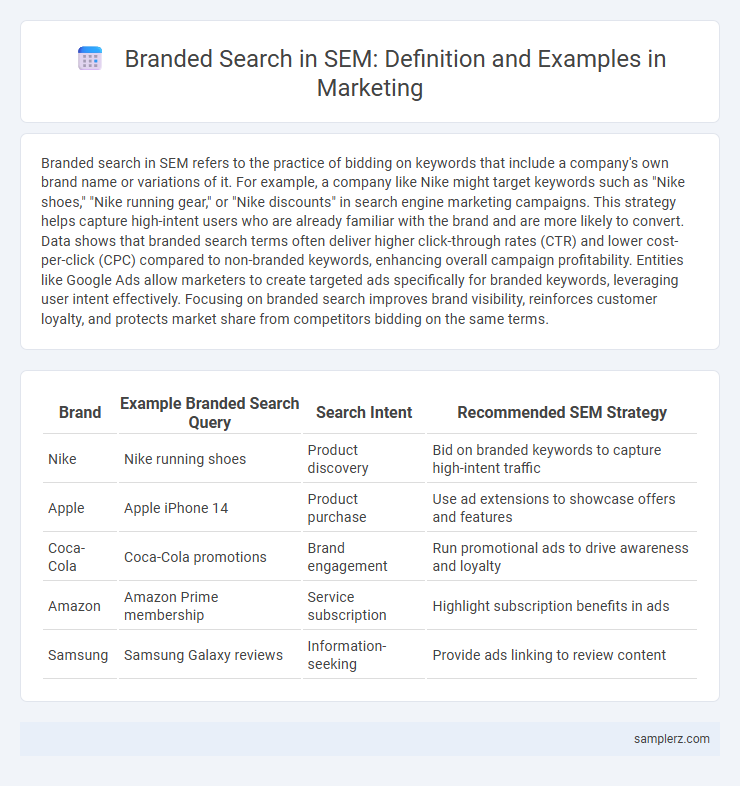Branded search in SEM refers to the practice of bidding on keywords that include a company's own brand name or variations of it. For example, a company like Nike might target keywords such as "Nike shoes," "Nike running gear," or "Nike discounts" in search engine marketing campaigns. This strategy helps capture high-intent users who are already familiar with the brand and are more likely to convert. Data shows that branded search terms often deliver higher click-through rates (CTR) and lower cost-per-click (CPC) compared to non-branded keywords, enhancing overall campaign profitability. Entities like Google Ads allow marketers to create targeted ads specifically for branded keywords, leveraging user intent effectively. Focusing on branded search improves brand visibility, reinforces customer loyalty, and protects market share from competitors bidding on the same terms.
Table of Comparison
| Brand | Example Branded Search Query | Search Intent | Recommended SEM Strategy |
|---|---|---|---|
| Nike | Nike running shoes | Product discovery | Bid on branded keywords to capture high-intent traffic |
| Apple | Apple iPhone 14 | Product purchase | Use ad extensions to showcase offers and features |
| Coca-Cola | Coca-Cola promotions | Brand engagement | Run promotional ads to drive awareness and loyalty |
| Amazon | Amazon Prime membership | Service subscription | Highlight subscription benefits in ads |
| Samsung | Samsung Galaxy reviews | Information-seeking | Provide ads linking to review content |
Introduction to Branded Search in SEM
Branded search in SEM involves targeting keywords that include a company's brand name or product names to capture high-intent traffic. For example, a search for "Nike running shoes" or "Apple MacBook Pro" directly connects users to the brand's official offerings, increasing conversion rates and protecting brand equity. This strategy enhances visibility on search engine results pages by prioritizing branded keywords that potential customers are more likely to click.
Key Features of Branded Search Campaigns
Branded search campaigns in SEM target specific keywords that include a company's brand name, enhancing visibility and driving high-intent traffic. Key features include higher click-through rates (CTR) due to brand recognition, better conversion rates from qualified leads, and comprehensive control over ad messaging and positioning. These campaigns also protect brand equity by preventing competitors from capturing branded traffic.
Real-World Examples of Branded Search Ads
Nike's branded search ads consistently dominate SEM campaigns by targeting keywords like "Nike running shoes" to capture high-intent shoppers directly searching for their products. Amazon leverages branded keywords such as "Amazon Prime" to drive traffic efficiently, ensuring their ads appear at the top of search results and enhance brand visibility. Coca-Cola uses branded search ads strategically during major events, bidding on terms like "Coca-Cola giveaway" to increase consumer engagement and boost conversion rates.
How Brands Leverage Their Names in SEM
Brands leverage their names in SEM by bidding on branded keywords like their company name or product lines, ensuring top search visibility and capturing high-intent traffic. Using branded search campaigns increases click-through rates (CTR) and improves conversion rates by targeting users actively seeking their products or services. This strategic focus reduces dependency on competitive generic keywords, optimizing advertising budget efficiency and strengthening brand recognition.
Comparing Branded vs. Non-Branded SEM Campaigns
Branded search campaigns target keywords that include a company's name, such as "Nike running shoes," yielding higher click-through rates and lower cost-per-click compared to non-branded campaigns like "running shoes." Non-branded SEM campaigns focus on generic keywords, driving broader awareness but often at a higher cost and lower conversion rate. Data shows branded campaigns generate more qualified traffic and higher ROI due to strong brand recognition and user intent.
Case Studies: Successful Branded Search Strategies
A notable example of branded search in SEM is Nike's campaign, which leveraged high-intent keyword targeting to dominate SERP real estate and increase click-through rates by 35%. Case studies reveal that Amazon's branded search ads optimized with product-specific keywords and timely promotions contributed to a 25% uplift in conversion rates. These successful branded search strategies demonstrate the importance of aligning ad copy with brand identity and utilizing consumer behavior data to maximize ROI.
Impact of Branded Search on Click-Through Rates
Branded search campaigns in SEM typically yield higher click-through rates (CTRs) because users actively seek the brand, demonstrating strong purchase intent. Studies show that branded keywords can generate CTRs up to 50% higher than non-branded keywords, significantly enhancing ad performance and return on investment (ROI). Leveraging branded search also improves ad relevancy and quality score, further boosting visibility and reducing cost-per-click (CPC).
Measuring ROI for Branded Search Campaigns
Measuring ROI for branded search campaigns involves tracking key performance indicators such as click-through rates, conversion rates, and cost per acquisition. Analyzing data from platforms like Google Ads and Google Analytics helps attribute revenue directly to branded keywords, providing clear insights into campaign effectiveness. Accurate ROI measurement enables marketers to optimize bids, budget allocation, and improve overall branded search performance.
Best Practices for Creating Branded Search Ads
Effective branded search ads in SEM emphasize including the brand name prominently in headlines and ad copy to enhance relevance and click-through rates. Utilizing ad extensions such as sitelinks and callouts can improve visibility and provide users with quick access to key brand information. Consistent use of targeted keywords aligned with the brand ensures higher quality scores and better ad positioning in search results.
Common Mistakes in Branded SEM and How to Avoid Them
Failing to bid on your own branded keywords allows competitors to capture valuable traffic, reducing overall ROI in branded SEM campaigns. Neglecting to use exact match types or phrase match can lead to irrelevant clicks and wasted budget, while ignoring negative keywords increases costs by triggering ads on unintended searches. Regularly monitoring keyword performance, implementing negative keyword lists, and maintaining strict match types optimize branded search efficiency and protect brand integrity in SEM.

example of branded search in SEM Infographic
 samplerz.com
samplerz.com